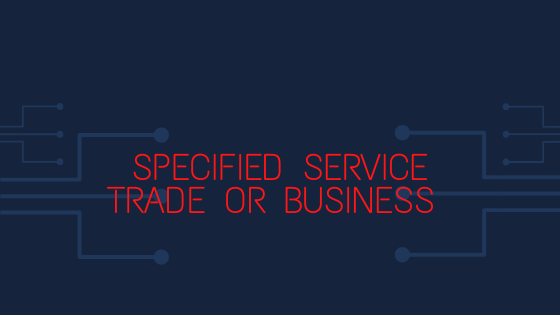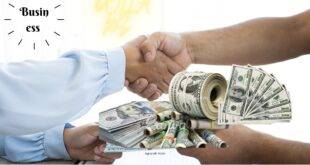Specified Service Trade or Business
A Specified Service Trade or Business according to Internal Revenue Service is “any trade or business. where the principal asset is the reputation or skill of one or more of its workers or owners”. Let’s try to grab the concept in a simpler way. The businesses or trades that involve the privilege or reliability of the business owners. Or its employees are termed as SSTB. These services also involve investing and investment management, dealing in securities, dealing in partnership interests and Commodities.
What is a specified service trade or business (SSTB)?
Every business or trade supply services about law, accounting, health, consulting, performing arts, brokerage services. The taxpayer of business or trade receives fees, income or compensation for endorsing their services, or products. For using images, name, trademark, signature and other symbols connected to the taxpayer’s identity. They use them for appearing on television, at an event or another media. It is call a specific service trade or business.
Specified trades or businesses can also be associated with businesses. Or might trades of investment management and investment partnership interests, dealing or trading in securities.
These fields or Services that are considered as SSTB are:
- Accounting
- Health
- Law
- Financial Services
- Consulting
- Performing Arts
- Brokerage Services
- Athletics
- Actuarial Sciences
- And any other trade or business whose primary asset is the reputation or skill of the worker.
In short, if a person runs a personal business that relies on his abilities and services. Then he is personally responsible if anything goes wrong. This includes negative feedback from clients. For who wants to take you to the court under contract for suing. The clients who might get injured or face any loss because of your contract with your company.
SSTB was considered for the first time by a large number of American taxpayers. or business analytics in 2018. when the USA implemented the modified section 199A. That involves the QBI or Qualified Business Income Deduction. According to this act, the taxpayers with SSTB can claim 20% of their income.
Which trade or business are excluded by SSTB
Those who are healthcare professionals, supply medical services directly to a patient define for services in the field of health. Health clubs, medical devices, manufacturing of pharmaceuticals … are excluded from SSTB. Besides, other trade or businesses that provide healthcare professionals are also excluded from SSTB.
In the field of brokerage services, SSTB would be narrowly defined, it only relates to the sale of securities for a fee or a commission. And this is a good chance for brokers and real estate agents to gain from the QBI deduction.
In the field of investment management and investing are focused mainly on financial investments. The reason is, principles are excluded from real estate management by SSTB.
I hope that it can make you satisfied and we can make long term cooperation.
Know More About Specified Service Trade Or Business
If you are a business owner or have a plan for a start-up. Then you must know that many financial
decisions may not affect your revenue. But those are important for running your business in the long run. Thus only if you make the right choice, then it will help you in tax deductions. For
instance, if you are running a consultancy or a law firm and you are paying. The same tax rates as
corporate, then you should know about specified service trade or business.
Are You Doing Any Specified Service Trade Or Business?
According to the definition of specified service trade or business. If the principal asset of any
business is the skill or reputation of the owner. Then it comes under SSTB, such as a clinic, law
consultancy, health, accounting service, architect, engineering, etc. Now the main advantage of
owning an SSTB business is. Supposed you are earning 20million dollars in total revenue, and
only 5% comes from SSTB. Then the whole entity will get consider as SSTB. And you can claim
QBI deductions in some circumstances.
As A Business Owner What Business Decision You Should Take?
To make sure you get the QBI deduction, you can hire a high-qualified chartered
accountant. Because if you reach threshold income, you will not be able to claim QBI deduction.
Hence, only a competent CA can make your income look perfect for QBI deduction. Only
professionals can suggest to you about tax deductions.
What is specified business trade and services which business included in this category?
It is the type of business where the main aim is to guide the client and get a commission fee. The person that is working fora business is also an employee, but he specified commission on the deal.
SSTB Can Be A Small Business Or Also A Big Business.
In this category of business health, brokerage, accounting, advisories, and many others included. Although, they also tell the government through their research and get a commission fee.
However, they work through their skills, behavior, and ability to interact with people. But most importantly, their convincing strategies help them to hold the clients. But they also have to follow the law which is implemented by the government.
These are not zero investment businesses. For example, if we talk about Real estate business, which based on SSTB.
How They Start Their Business How They Get A Commission?
These companies paid a handsome amount to get licenses by the government. Then they can hire their employees. however, they trained and skilled them according to the need of the business.
In Adittionon SSTB provide life insurance and fixed salary to the employee. But the company works on commission.
SSTB business also pays tax when their business exceeds the amount decided by the government. It’s important to maintain a good reputation whenever you get this. A chain of people starts which becomes your clients.
Which Businesses Are Considered a Specified Service Trade or Business
As a company owner, earnings aren’t directly involved by a lot of your major decisions. It’s all about making the correct decisions when it comes to tax deductions.
One such instance is the skilled small business income deduction. A new benefit for several U.S. small company owners. But if you run a specified service trade or business (SSTB). Then you may maintain the QBI in certain conditions. Here is what you want to understand to maintain your company’s bottom line wholesome as you can.
What Qualifies as an SSTB?
The Internal Revenue Service (IRS) has a fairly precise definition of SSTB. It involves “any trade or business where the principal asset is the reputation. Or skill of at least one of its owners. Or employees “The agency goes on to define as managing an SSTB. People supplying services performing arts, accounting, actuarial science, and consulting, among others.
This isn’t a comprehensive list of specified service trade or business. The IRS issued additional statements to clarify the “standing or ability” term refers mostly to star earnings. But that isn’t the factor which may make it hard to ascertain what’s specified service trade or business. The IRS excluded some careers in the SSTB definition. Such as engineering, architecture, and a few services jobs.
Advisers, though they’re especially cited in the IRSspecified service trade or a business list. Do not fall under the definition. The IRS excludes salespeople that provide training classes. Although advisers maybe people who provide guidance.
Specified Service Trade or about Business
“Business” is one of the most common words for all of us. But, do we have concepts about business? Someone of us might have. Let’s learn about business and one of its class named SSTB. The word “Business” directs us to an occupation. Where the owner makes profit by making and selling products and the Entrepreneur. Or largely known as Owner hires people to work for these. Sometimes, a group of people can also own a business.
Earning profit or money
Earning profit or money is not the prime objective of all the business or businessmen. Somebody chooses this profession for another reason. They want a reputation in this World. They want to earn this through their skills or their employer’s skills. In this case, the term “Specified Service Trade or Business(SSTB)” comes into play. It is a class of business where the owner tries to make ‘Reputation’ as his capital asset.
Besides, the consumers also get proper service from this class. As a company tries to be reputed among his consumers.
Sectors of SSTB Generally, the following sectors are in included in this class:
* Health· * Performing arts
* Law *Actuarial science
*Athletics *Actuarial science
*Consulting· *Investment management
*Accounting·
Trading etc. These are the specified sectors. But every business can be recognized as SSTB if that business’s prime objective will Reputation.
Reasons for choosing SSTB
We all can have questions about why a businessman will choose SSTB for business. The answer can be given in this way. The owner tries to provide good and quality service to his consumers. The owner also tries to repute and establish his business for a longer-term. On the other hand, these sectors get more attention from the Govt. Regarding tax or in many sections like that. In this regard, we can say that SSTB can be a good class for the owners.
Specified Service Trade or Business consulting
A Specified Service Trade or Business (SSTB) is an exchange or business. where the central resource is the notoriety or aptitude of at least one of its owners or workers.
The IRS determines these exercises as any trade or business. “including the presentation of administrations in the fields of wellbeing, law, bookkeeping, actuarial science, performing expressions, counseling, sports, money related administrations, contributing. And venture the executives, exchanging, managing in specific resources. Or any exchange or business where the important resource is the notoriety or aptitude of at least one of its representatives or proprietors.”
In the event that you are in a predetermined help business. The Qualified Business Income Deduction starts to eliminate. When your salary comes to $160,700 for singles and $321,400 for wedded documenting together. The 20% derivation is diminished to $0 when you win $210,700 for people and $421,400 whenever wedded documenting mutually.
Examples of specified Service Trade Business
Services in the field of well-being are defined only to include health care professionals. Who provide therapeutic services directly to a patient. Now barred from being an SSTB are health clubs and related amenities, medicinal research, and examination services. And the formation and sales of pharmaceuticals and medical devices. Additionally, other companies assisting healthcare experts such as medical billing aids would be excluded from the interpretation of an SSTB.
Specified service or trade businesses in the field of brokerage services have been closely described to include. Only help to link to the sale of salvation for a percentage or fee. This opens the gateway for real estate agents and merchants along with insurance agents and brokers to benefit from the QBI deduction. Additionally, the definition of financing and venture administration appears to be concentrated chiefly on economic investments. As the management has specifically banned real estate management from being an SSTB under investment management.
Possibly the most remarkable definition included in the organizations is that for “any trade or business. Where the capital asset is the status or skill of 1 or more of its employees or owners. This once anticipated catchall procurement has been defined to only include fees for endorsing goods. Use of a person’s image, title, voice, tag or other similar symbols associated with the somebody, and exhibitions. This type of specified service or trade business. Now seems to be focused on fees earned by entertainers and celebrities as opposed to other traditional trades or businesses.
Key Business Decisions of SSTB Owners
SSTB might be an assessment definition. In any case, it catches an enormous number of business visionaries who work a particular sort of business. Frequently, the accomplishment of these businesses comes down to the quality and volume of services gave by the proprietor. That implies a great deal of hazard lies with the individuals at the top. That is the situation whether the SSTB goes through a substance is sole ownership, association, LLC, or S-corp.
Consider the accompanying tips to keep your business running easily:
Contract a certified bookkeeper to discover your independent company charge derivations. This is especially significant since SSTB status bars you from guaranteeing the QBI once you arrive at the limit income sum.
Research and purchase the correct business protection. Specifically, if you maintain an individual services business. You might be mindful if something turns out badly. That can incorporate anything from despondent customers who need to sue under the agreement. To customers who have been harmed or endured misfortunes as the aftereffect of their collaboration with the organization.
Talk with business supervisors about blended service undertakings. As examined, you can lose the QBI finding regardless of whether just a little level of your receipts originate from SSTB. Work with somebody who can assist you with finding the correct equalization. That permits you to develop and extend while restricting your taxation rate.
To round up, your business decisions rely upon numerous elements. Watch your developing income, and keep up positive associations with expenses and bookkeeping experts who can give important counsel. At that point, you' ll have a decent involvement in IRS come charge time, regardless of where your income level untruths.
Is engineering a specified Service Business
A specified service trade or business is any trade or business. Offering types of assistance in the fields of wellbeing, law, bookkeeping, actuarial science, performing expressions, counseling, games, budgetary services, financier services. Or some other trade or business.
where the citizen gets expenses, remuneration, or other income for supporting items or services.For the utilization of the citizen's picture, similarity, name, signature, voice, trademark. Or some other images related to thecitizen's character, or for showing up at an occasion or on radio, TV, or another media design.
The trades or businesses of contributing adventure the executives, exchanging or managing in protections, organization interests, or wares are specified trades or businesses. As a business proprietor, a considerable lot of your significant monetary decisions don't straightforwardly include income. Now and again, it' stied in with settling on the correct decisions with regards to imposingreasonings.
Specified Trade or business
Being a businessman, there are a lot many things that you need to rely on. Decisions regarding finance it should take with the proper time. A specified trade or business is that kind of business that involves a basic skill that its owner owns. It falls under these categories
- Heath
- Law
- Dealing
- Trading
- Athletics
What is a specified trade or business?
A specified trade or business is that kind of trade that gives services in different fields like health, accounting, law, performing arts, trading, etc. Here taxpayer receives compensation for promoting his/her products and services to build the name of the taxpayer’s identity or for showing appearance on tv, radio or any social media. Internal Revenue service omitted some jobs or professions from the SSTB list like architecture and engineers are not on the list. Consultants also not come under this category. Likewise, doctors come under SSTB but fitness instructors are not.
Although specified trade or business works as a tax definition. Nevertheless, it also includes several entrepreneurs who work for a specific business.
The success and growth of the business solely depend on the goods and services given by the owner of the business. The owner has to deal with the risk factors.
The above-mentioned things related to specified trade or business were true in section 199A tax code. IRS published proposed regulations on August 8, 2018, to better elaborate the qualified business income deductions along with anti-abuse rules.
specified service trade or business List
- Service Sector is continually increasing. Specified service trade or business requires a specialized set of skills that can help you position in the market with better brand perception. Most of the time, all the services businesses which may include food & beverages, doctors, lawyers, catering, accounting, marketing, and other consultancies require specialization. The success in such services businesses depends very much on the passion and commitment of the owner. If he or she chose a field in any specific service trade or business is not close to his or her heart and he or she is not fully engaging with it. It will become very hard to get the desired success.
The business requires a lot of hard work and many a time you also have to manage the problems of the business. It can be human resources, capital expenses and accounting and finance issues as well as business losses and pilferages. Due to the forthcoming problems, more than 90% of the businesses shut down in losses and the owner or the founder gives up too soon. The passion means that one can stand the ground firmly not to get scared easily. As far as specified service trade or business is concerned, they usually do not deal with tangible products, most of the time they deal with intangibles and they have to take into account the concept of service-scape by providing the complete holistic experience which should result in delighting the customer.In the present times, the name of the game is in specialization, one cannot just master everything under the sub. You have to choose your field very carefully based on your passion and strengths, this kind of specified service trade or business can put you in a very advantageous position to achieve some of the best results.
What is swing trading?
Swing trading is a trading strategy where investors buy a stock or some other asset and hold it – known as holding a position – for a short period of time (usually between a few days and up to a several weeks) in the hopes of turning a profit.
The goal of the swing trader is to capture a portion of any potential price movement or “swing” in the market. Individual gains may be smaller as the trader focuses on short-term trends and seeks to cut losses quickly. However, small gains achieved consistently over time can add up to an attractive annual return.
How does swing trading work?
The swing trader analysis patterns in trading activity to buy or sell a stock in order to capitalize on price movements and momentum trends of stocks, typically, focusing on large-cap stocks since they are the most heavily traded. Because these stocks have high trading volumes, they offer investors insight into how the market perceives the company and their security’s price movements. This active trading offers the information necessary for what’s called technical analysis, which we’ll cover in the next section.
As with any style of trading, swing trading carries plenty of risk. Swing traders are exposed to several types of risk, the most common being gap risk, where a security’s price rises or falls significantly based on news or events that occur while the market is closed, whether overnight or during a weekend.
The opening price will reflect the shock of any unexpected news. The longer the market is closed, the greater the risk. Abrupt changes in the market’s direction also pose a risk, and swing traders may miss out on longer-term trends by focusing on shorter holding periods.
The role of technical analysis
Swing traders use technical analysis, which is the study of statistical trends and patterns on a stock chart, to spot trading opportunities. It’s for this very reason that trading can be as intimidating as it is risky.
As such, technical analysis underpins swing trading as it holds that past trading activity and price movements can indicate future price movements. Swing traders rely on a wide variety of technical indicators and charts to gain insight into market psychology, analyzing multi-day patterns to determine the likely direction of a stock price.
Example of swing trading
Let’s take a look at a real-world example of how a swing trader may analyze Amazon’s stock and determine when to buy or sell.

The candlestick chart above illustrates the “cup and handle” consolidation pattern, where the cup is u-shaped and the handle points slightly downward. This pattern is considered a bullish signal.
If a swing trader wants to make a profitable trade in Amazon, they would likely purchase the stock at the top of the “cup,” at or above the most recent high of $3,555. They should place a stop-loss order at the most recent low in the cup handle ($3,395). Therefore, the risk – the maximum loss on the trade – is $160 ($3,555 – $3,395 = $160).
At the recommended reward/risk ratio of 3:1, which is considered good, you’d need to sell at $480 (3 x $160 = $480) above the entry price, or $4,035 ($3,555 + $480).
Why risk management is critical in swing trading
Risk management is the most essential component in a successful swing trading strategy. Traders should choose only liquid stocks and diversify positions among different sectors and capitalizations.
Mike Dombrowski, head of capital markets at InterPrime Technologies, emphasizes the importance of risk management, saying that “each position should be roughly 2%-5% of total trading account capital. The most aggressive and professional traders may go up to 10% per position. That means a portfolio of five concentrated swing trades would represent 10%-25% of total trading account capital on average.
Having cash in reserve allows you to add to the best-performing trades to help generate larger winners. As always, the key to swing trading is to minimize losses.” He also notes that a desirable reward/risk ratio is 3:1, or 3 times the amount at risk.
Stop-loss orders are a vital tool in managing risk. When a stock falls below the stop price (or rises above the stop price for a short position), the stop-loss order converts to a market order, which is executed at the market price. With stop losses in place, the trader knows exactly how much capital is at risk because the risk of each position is limited to the difference between the current price and the stop price.
A stop loss is an effective way to manage risk per trade
Swing trading strategies
Traders can deploy many strategies to determine when to buy and sell based on technical analysis, including:
- Moving averages look for bullish or bearish crossover points
- Support and resistance triggers
- Moving Average Convergence/Divergence (MACD) crossovers
- Using the Fibonacci retracement pattern, which identifies support and resistance levels and potential reversals
Traders also use moving averages to determine the support (lower) and resistance (upper) levels of a price range. While some use a simple moving average (SMA), an exponential moving average (EMA) places more emphasis on recent data points.
For example, a trader may use 9-, 13- and 50-day EMAs to look for crossover points. When the stock price moves above, or “crosses” the moving averages, this signals an upward trend in price. When a stock price falls below the EMAs, it’s a bearish signal and the trader should exit long positions and potentially put on shorts.
Market extremes make swing trading more challenging. In a bull or bear market, actively traded stocks do not exhibit the same up-and-down movements within a range as they do in more stable market conditions. Momentum will propel the market up or down for an extended period. “[Traders should] always trade in the direction of the trend, taking long positions in bull markets and shorts when the markets trend
Swing trading vs. day trading
Swing trading and day trading have many similarities, but the most marked difference is the frequency of trades. Swing traders focus on short-to-medium term positions while day traders close out their positions at the end of each trading day. Day trading is a full-time job, requiring the trader to monitor market movements throughout the day and trade frequently. A swing trader can manage and trade on the side while still maintaining a full-time job.
Let’s look at the principal differences.
Swing trading Day trading Trading frequency Mulitple trades per week Multiple trades per day Time required to trade Can be done periodically Requires constant attention Number of transactions Fewer transactions Many intra-day transactions Profit potential Gains and losses accumulate slowly Gains and losses accumulate more quickly Trading outlet Brokerage account Specialized trading software Costs Lower Higher The financial takeaway
Swing trading is an easy way for new traders to get their feet wet in the market, with traders typically starting with $5k-$10k, although less is acceptable. The cardinal rule though is that this capital should be money the investor can afford to lose. Even with the strictest risk management, the unexpected is always possible.
More importantly, swing trading doesn’t demand the same level of active attention as day trading, so the swing trader can start slowly and build the number of trades over time. But it does require the investor to take a deep dive into technical analysis, so an aptitude for charts and numbers is necessary.
For traders willing to spend time researching stocks and developing an understanding of technical analysis, swing trading offers the potential to accumulate attractive profits, slowly but steadily, over time.
Trading and investing are two approaches to playing the stock market that bring their own benefits and risks Short selling is a high-risk but high-reward trading strategy that profits from a stock price’s fall A long position means you buy a stock or stock option in the bullish belief its value will increase over time Margin trading means buying stocks with borrowed funds – it’s riskier than paying cash, but the returns can be greater
 Best Business Ideas Open up your business to new possibilities.
Best Business Ideas Open up your business to new possibilities.








